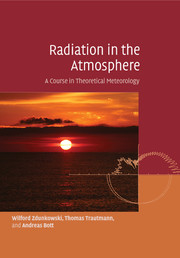Book contents
- Frontmatter
- Contents
- Preface
- 1 Introduction
- 2 The radiative transfer equation
- 3 Principles of invariance
- 4 Quasi-exact solution methods for the radiative transfer equation
- 5 Radiative perturbation theory
- 6 Two-stream methods for the solution of the radiative transfer equation
- 7 Transmission in individual spectral lines and in bands of lines
- 8 Absorption by gases
- 9 Light scattering theory for spheres
- 10 Effects of polarization in radiative transfer
- 11 Remote sensing applications of radiative transfer
- 12 Influence of clouds on the climate of the Earth
- Answers to problems
- List of frequently used symbols
- References
- Index
9 - Light scattering theory for spheres
Published online by Cambridge University Press: 18 December 2009
- Frontmatter
- Contents
- Preface
- 1 Introduction
- 2 The radiative transfer equation
- 3 Principles of invariance
- 4 Quasi-exact solution methods for the radiative transfer equation
- 5 Radiative perturbation theory
- 6 Two-stream methods for the solution of the radiative transfer equation
- 7 Transmission in individual spectral lines and in bands of lines
- 8 Absorption by gases
- 9 Light scattering theory for spheres
- 10 Effects of polarization in radiative transfer
- 11 Remote sensing applications of radiative transfer
- 12 Influence of clouds on the climate of the Earth
- Answers to problems
- List of frequently used symbols
- References
- Index
Summary
Introduction
The evaluation of the radiative transfer equation requires a detailed knowledge of the extinction and scattering properties of atmospheric particles. In most cases we rely on theoretical calculations assuming that the scattering particles have a spherical shape. In order to carry out the calculations we must specify the particle size and the wavelength-dependent complex index of refraction. The required calculations are known as Mie calculations while the entire theory is called the Mie theory. This goes back to Gustav Mie who published the whole theory in 1908. Nowadays a large number of reliable computer programs are available to provide the required information without understanding the theory behind it. This might be sufficient in some cases, but it is more valuable to comprehend the theoretical background which will be presented in the following sections.
The Mie theory of light scattering by homogeneous spheres is based on the formal solution of Maxwell's equations using proper boundary conditions. In this text we will follow Stratton's discussion of the Electromagnetic Theory (1941). In van De Hulst's (1957) treatise Light Scattering by Small Particles many mathematical details of the Mie theory are omitted, but numerous helpful physical explanations are given. In particular he gives a number of approximate formulas for special cases.
Information
- Type
- Chapter
- Information
- Radiation in the AtmosphereA Course in Theoretical Meteorology, pp. 333 - 377Publisher: Cambridge University PressPrint publication year: 2007
